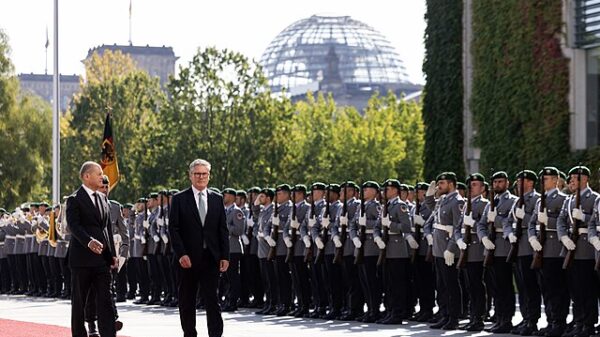Staff writer Guillaume Antignac on the woes the Conservative Party faces in the aftermath of the recent turbulent weeks and why these problems are recurring.
Summer 2022 ended with the Royal period of mourning, the leaves turned brown, and the fog, rain and grey sky returned to London. The new Prime Minister Liz Truss assumed office on September 5, just days before the nation lost it longest reigning monarch. It was a period during which one might have assumed the chaos of a few months back was history. However, toil and trouble are ever-present in the boiling cauldron that is the Conservative party.
On Friday, September 23, the Chancellor of the Exchequer Kwasi Kwarteng presented his mini-budget to Parliament. Among many reforms and cuts, by far the most alarming was his announcement to “abolish the additional rate of income tax”, reducing the tax of those earning over £150,000 by 5%. The total impact of these cuts was estimated to cost the treasury £45 billion, yet the government gave no clear explanation as to how these cuts would be funded, nor whether the cuts were overseen or accompanied by analysis and projections from the Office of Budgetary Responsibility. Instead, Kwarteng simply stated that these reforms “will benefit the whole economy and the whole country”. This statement couldn’t have been more wrong. The same day, the pound dropped in value by 3 cents against the dollar, and interest rates rose from 1.75% to 2.25%. When the markets reopened on Monday, September 26, it was chaos anew – the pound dropping further and gilt market yields (gilts are the equivalent of US Treasury securities in their respective countries) rose to unprecedented heights at the sight of the increasing government borrowing.
This is old news. A month of resistance, followed by sackings and resignations, left the Conservative Party in dire straits as they recommenced the process of appointing a new party leader. In Rishi Sunak, they hope to have found a more responsible head of the party. “Borrowing your way out of inflation is not a solution, it’s a fairy-tale” was his response denouncing Truss’s plan during a Sky News debate in mid-July, foreseeing what would become reality. But, although Truss was criticised (as she became not only the shortest sitting, but also, as polling suggests, the least popular Prime Minister in history), her resignation, though demanded by many, may have added to the current detriment of British politics. MPs are likely gasping for air, but from a citizen’s perspective, it seems absurd that just months after Boris Johnson resigned, his replacement left the post for more or less the same reasons. Inefficacy, incompetence, and denial seem almost to be a prerequisite to become head of the Tory party. The justification for the inability to deal with the cost-of-living crisis, the rising inflation, or the rising energy prices appear to lie in some grey area between the impact of the war in Ukraine and the restrictions imposed on Russia, and the economic effects of the Covid-19 pandemic and a so called “bungee-jump” effect.
However, there lies in the shadow of these effects something else that is straining the British economy. Truss and Kwarteng were insistent on their attainment of economic growth but seemed to ignore the increasing effects Brexit is having on business and trade. The British Pound has dropped by 10 percent since the 2016 Referendum, which the Financial Times claims has cost every household roughly £870. And when comparing Britain’s exports to other advanced economies around the globe, there is a clear slump at the time of the Covid-19 lockdowns, which Britain fails to grow out of like other countries’ exports.
While Eurozone countries are projected to follow the same inclining curve the world economy is projected to take, the projection for the British economy’s growth in the coming fiscal year remains flat. Claims of a rapid post-Covid recovery and subsequent plateau are a popular explanation for this, yet it is also clear that small businesses are increasingly struggling to maintain their trade relations with their EU partners, and this is impacting the British economy’s ability to grow in the wake of the pandemic. Though exports haven’t been drastically hurt, imports have dropped by almost 30% since the Trade and Cooperation Agreement (TCA) took effect in 2021 after the transition period, and many businesses who depended on EU imports must now find alternatives as their goods spend too much time at the border or simply cost too much or both.
This is arguably the reason there is increasing scepticism in the UK markets. Investment growth has plateaued since the Brexit vote in 2016, proving that people are uncertain about the future of post-Brexit Britain. And this is also arguably the cause of the intense backlash and rise in gilt yields seen in Britain’s financial sector in the wake of the Conservative Party’s mini-budget. People see the impact Covid-19 and the sanctions on Russia are having on inflation and living costs, but they are also very aware of the Brexit-effect and are concerned the government seemingly isn’t.
Addressing this puts the Tories in an uncomfortable position, as they are the primary cause of this. After having riled up half the country with his Vote Leave campaign, ‘Lord of Demagogues‘ Nigel Farage disappeared from politics, leaving an overwhelming task for the Conservatives to accomplish. Though Boris Johnson’s final deal and the way he got it through Parliament was dodgy, to say the least, after the national headache that was EU-UK Brexit deal discussions, everybody just wants to forget the whole thing and move on, including the Labour party. But this is precisely the issue currently at hand. The Brexit-effect is now in full swing, and if the new Prime Minister, Rishi Sunak, doesn’t take this into account, we may see him too announcing his departure from No. 10.
















